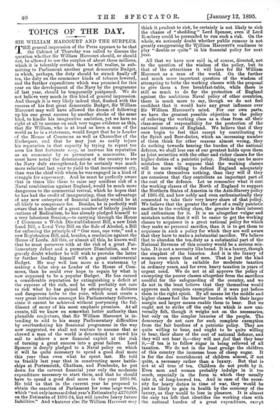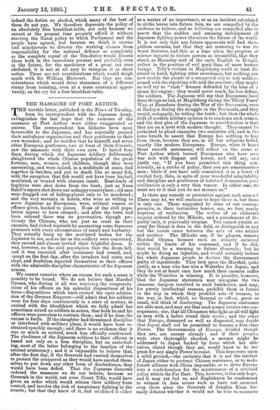- TOPICS OF THE DAY.
SIR WILLIAM HARCOURT AND THE SURPLUS. TRE general impression of the Press appears to be that the Cabinet of Thursday was called to discuss the question whether Sir William Harcourt should, or should not, be allowed to use the surplus of about three millions, which it is tolerably certain that he will realise, in sub- mitting to Parliament another great democratic Budget, in which, perhaps, the duty should be struck finally off tea, the duty on the commoner kinds of tobacco lowered, and the further expenditure which was promised for this year on the development of the Navy by the programme of last year, should be temporarily postponed. We do not believe very much in this kind of general impression. And though it is very likely indeed that, flushed with the success of his first great democratic Budget, Sir William Harcourt may well have allowed the dream of following up his one great success by another stroke of the same kind, to kindle his imaginative ambition, yet we have no right at all to assume on such very vague evidence as this, that Sir William, who is at least as keen a man of the world as he is a statesman, would forget that he is Leader of the House of Commons as well as Chancellor of the Exchequer, and that he may just as easily injure his reputation in that capacity by trying to repeat too soon his first fortunate coup, as increase his reputation as an economist by so premature a manceuvre. He must have noted the determination of the country to see the Navy duly strengthened, for he certainly was much more reluctant last year to yield to that inconvenient cry, than was the chief with whom he was engaged in a kind of struggle for supremacy. And he must be perfectly aware that in times like these to raise any needless risk of a Naval combination against England, would be much more dangerous to the commercial revival, which he hopes that he has had the credit of inaugurating, than the advantage of any new enterprise of financial audacity would be at all likely to compensate for. Besides, he is perfectly well aware that as leader of a great number of bitterly jealous Eections of Radicalism, he has already pledged himself to a very laborious Session,—to carrying through the House f Commons a Welsh Disestablishment Bill, a new Irish Land Bill, a Local Veto Bill on the Sale of Alcohol, a Bill for enforcing the principle of "One man, one vote," and a new Registration Bill, and, besides, a resolut1on against the House of Lords. All this, or almost all this, he knows well that he must persevere with at the risk of a great Par- liamentary defeat and a premature Dissolution, and we gravely doubt whether he will wish to provoke the latter by further loading himself with a great controversial Budget. He may well lose more as a statesman by making a false step as Leader of the House of Com- mons, than he could ever hope to regain by what is now supposed to be a popular Budget. He has earned a considerable reputation by extinguishing a deficit at the expense of the rich, and he will probably not care to risk what he has gained by attempting a dubious and dangerous bribe to the poor, which must create a very great irritation amongst his Parliamentary followers, since it cannot be achieved without postponing the ful- filment of many of his most emphatic promises. At all events, till we know on somewhat better authority than plausible conjecture, that Sir William Harcourt is in- tending to add to his many Parliamentary difficulties by overburdening his Sessional programme in the way now suggested, we shall not venture to assume that so shrewd a man of the world is determined to crowd his sail to achieve a new financial exploit at the risk of turning a great success into a great failure. Lord Spencer is deeply pledged to a Naval policy on which it will be quite necessary to spend a good deal more this year than even what he spent last. He told us frankly last year • that in constructing more battle- ships at Portsmouth, Chatham, and Pembroke, he put down for the current financial year only the moderate expenditure necessary to start them, and that he should have to spend a good deal more in the year 1895-96. He told us that in the current year he proposed to obtain the sanction of Parliament for some large works, which "not only increa sed that year's Estimates by X270,000 on the Estimates of 1893-94, but will involve heavy future liabilities." And whatever else Sir William Harcourt may think it prudent to risk, he certainly is not likely to risk the chance of " shedding " Lord Spencer, even if Lord Rosebery could be persuaded to run such a risk. On the whole, we seriously doubt whether public rumour is not greatly exaggerating Sir William Harcourt's readiness to play "double or quits" in his financial policy for next year.
All that we have now said is, of course, directed, not to the question of the wisdom of the policy, but to that of the attractions it will have for Sir William Harcourt as a man of the world. On the further and much more important question of the wisdom of attempting to bribe the working classes with the proposal to give them a free breakfast-table, while there is still so much to do for the protection of England against the ambitious Naval policy of other countries, there is much more to say, though we do not feel confident that it would have any great influence over Sir William Harcourt's mind. For our own parts, we have the greatest possible objection to the policy of relieving the working class as a class from all their class-sense of responsibility for the protection of the national interests of England. We believe that if they once begin to feel that except by contributing to the Spirit and Beer-duties, which an increasing number of them think for other reasons almost wrong, they do nothing towards bearing the burden of the national defence, we shall lose one of our greatest holds upon them as joint securities with the other and richer classes for the higher duties of a patriotic policy. Nothing can be more mistaken than to suppose that the working classes will be more willing to defend England adequately if it costs themselves nothing, than they will if they are conscious that they contribute an important part of the cost of the defence. Let us remember what it cost the working classes of the North of England to support the Northern States of America in the Anti-Slavery policy of 1861-62, and how nobly and even enthusiastically they consented to take their very heavy share of that policy. We believe that the greater the effort of a really patriotic sacrifice to the working class, the greater is their interest and enthusiasm for it. It is an altogether vulgar and mistaken notion that it will be easier to get the working classes to acquiesce in a great national policy for which they make no personal sacrifice, than it is to get them to acquiesce in such a policy for which they are well aware that they have to make a substantial sacrifice. We believe that to abandon the tea-duty as a substantial part of the National Revenue of this country would be a serious mis- take. It is not a necessity like bread. It is a luxury, though the simplest of the luxuries. And it is the luxury of women even more than of men. That is just the kind of luxury which is suitable for moderate taxation in ordinary years, and for even heavy taxation in years of urgent need. We do not at all approve the policy of exempting the poorer classes altogether from the sacrifices needful for the safeguarding of the country, and we do not in the least believe that they themselves would approve such complete exemption if it were put before them in the right spirit. By all means let the middle and higher classes feel the heavier burden which their larger margin and larger means enable them to bear. But we ought not to strike off the only tax which is now uni- versally felt, though it weighs not on the necessaries, but only on the simpler luxuries of the people. The democracy do not care for such complete exemption from the fair burdens of a patriotic policy. They are quite willing to bear, and ought to be quite willing to bear, their share of the cost of national defence, and they will not bear it,—they will not feel that they bear it,—if tea is to follow sugar in being relieved of all taxation. We do not in the least grudge the children of this country the immense boon of cheap sugar. It is for the due nourishment of children almost, if not quite, a necessary rather than a luxury. But that is not at all true of tea. Children do not profit by it. Even men and women probably indulge in it too much, especially in the form in which they usually take it, of long-brewed tea. And in case of the neces- sity for heavy duties in time of war, they would be just as likely to gain in health by the economy of the luxury, as they would to lose in pleasure. It is almost the only tax left that identifies the working class with the national burden of a great expenditure, except indeed the duties on alcohol, which many of the best of them do not pay. We therefore deprecate the policy of an absolutely free breakfast-table, not only because we cannot at the present time properly afford it without starving the Naval policy to which Parliament and the people have agreed, but because we think it unwise and mischievous to divorce the working classes from responsibility for the national defence so completely as the complete repeal of the Tea-duties would divorce them both in the immediate present and probably even in the future, for the machinery of a great tax once abolished, it is not at all easy to reimpose it at short notice. These are not considerations which would weigh much with Sir William Harcourt. But they are con- siderations which would deter statesmen of a different stamp from insisting, even at a more convenient oppor- tunity, on the cry for a free breakfast-table.



































 Previous page
Previous page